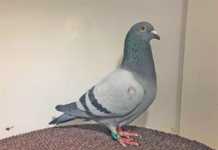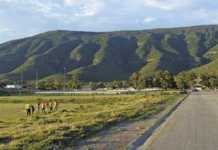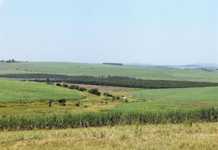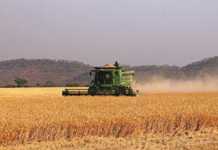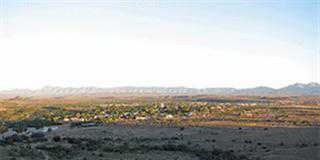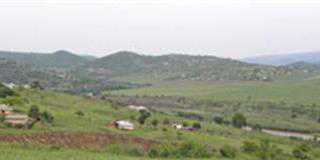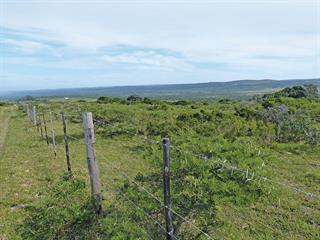
Malcolm Cock (68) has spent much of his life fighting for adequate compensation for land expropriated by the apartheid government in 1980. The property comprises the farms Lessendrum, Newcastle, Salisbury Plain, Thornhill, Ravensworth and Winnowdale in the former Ciskei, totalling about 2 400ha.
The disappointment of receiving far less compensation than expected was aggravated, Malcolm says, by news that the farms had been controversially transferred to Ciskei government minister Nigel Poni.
According to Malcolm, Poni died in the late 1990s and his family have since then consistently refused him access to the Cock family cemetry on Lessendrum. Farmer’s Weekly joined him for his third visit here in 35 years, arranged through the commercial farmers leasing the property.
‘’Years ago, I brought my young kids back and it broke my bloody heart,” says Malcolm as we walk among the neglected graves.

The Cock graveyard on Lessendrum. In the foreground is the grave of Cuthbert Cock, who died in 1973.
He has approached Poni’s widow, Liziwe, “numerous times” seeking permission to clean up the cemetery, he says, but this has not been granted. Malcolm believes this might have something to do with the fact that he has continued to fight for compensation for the land.
History
The 1820 Settler, William Cock, established his son Cornelius on coastal land between the Great Fish and Mpekweni river mouths. After Cornelius died in 1908, his seven children continued to farm the Cock properties in the Peddie district.
In the 1960s, Cornelius’s last remaining son, Cuthbert, who was childless, bequeathed the farms to his great-nephew, Edgar, Malcolm’s father. At the time, Edgar was living in Zimbabwe, where his father, Alfred (son of Cornelius’s brother, Nathaniel), had ended up after leaving the Eastern Cape to seek his fortune on the diamond mines of Kimberley in the late 1800s.
Edgar and his wife Mary and the rest of his family took possession of the land in 1963.
After finishing schooling, Malcolm completed a trade test (mechanic) and took a job in a construction company building the nearby R72 to Port Alfred. Later, he established a dairy and a smallstock initiative on the Cock farms while running a trading store.
By 1971, when Malcolm married Shirley Marsberg from Peddie, it was common knowledge that the apartheid state would be expropriating large parts of the Eastern Cape to consolidate the Ciskei and the Transkei bantustans.
A struggle to farm
After a brief spell in Zimbabwe, Malcolm took a job at Mercedes-Benz in East London for a few years before returning to assist his father on the Cock farms as Edward, his eldest brother, had by then moved to a farm in the nearby Southwell district in preparation for expropriation.
The threat of expropriation had hampered Edgar’s ability to farm effectively on the Cock properties. Just one result was that financial institutions refused to approve financing as long-term land tenure could not be guaranteed.

The entrance to Fairview farm near Port Alfred, where Malcolm and Shirley now live.
After the death of Cuthbert in mid-1973, for example, Edgar was faced with death duties that forced him to decrease his beef breeding herd of more than 500 cows to about 200. Malcolm recalls how his father’s attempts to source financing to replace these animals was rejected by various financial institutions.
Fortunately, the Cock properties were exceptional livestock farms and Edgar managed to breed quality replacement animals. The farms’ Afrikaner/ Shorthorn/Hereford crossbred cows produced weaners with an average weight of 250kg at 205 days from the sweetveld. (In the late 1970s, they bought Bonsmara bulls.)
Sheep, goats, horses, pigs and a variety of cash crops, including lucerne, also thrived on the well-watered land.
The axe falls at last
In the late 1970s, it was finally confirmed that the Cock farms would be expropriated by 1980. Malcolm began negotiating the purchase of Fairview farm near Port Alfred – where he lives today – while his father oversaw the sale of cattle as the expropriation process dragged on – to a disappointing conclusion.
“We were paid a mere pittance for the farms – one-third in cash and the balance in government bonds, which earned 7,5% interest,’’ recalls Malcolm. This amounted to about R208/ha. “Soon after, [expropriation] interest rates rose to 24% – a boat we missed!’’
Rejecting the prices was futile.
“They said that if we turned the price down, they’d put us at the bottom of the list and would smoke us out. Had we remained on these farms, my two brothers and I could have farmed comfortably on 800ha each without debt.”
Redress
“After moving off these farms, my older brother and I bought our farms through the Land Bank, but my younger brother couldn’t afford to farm,” says Malcolm. “The farms we bought were far inferior to those we lost and we still battle financially today – it ruined our lives.’’
Malcolm, however, believed that the future might give him an opportunity to claim proper compensation for the former Cock farms. Sure enough, by the mid-1990s apartheid had unravelled, along with bantustans. So Malcolm approached Dr Peter Mayende, the then-Land Claims Commissioner for the Eastern Cape.
Mayende was sympathetic, and called the remuneration that the family had received “inconvenience money”. However, he advised Malcolm that it was unlikely that white commercial farmers would be eligible to claim for fair compensation in terms of the Restitution of Land Act of 1994.

Malcolm Cock
Undaunted, Malcolm, by then chairperson of the Eastern Border Farmers’ Association (EBFA), made a point of meeting representatives of the Eastern Cape Department of Land Affairs (ECDLA) every time he visited family in East London.
In late 1995, he had an opportunity to make direct contact with the then Minister of Agriculture and Land Reform, Derek Hanekom, who had been invited to attend a farmer’s day in the region.
Malcolm pointed out to the minister that the farms that had been expropriated in Peddie had all but collapsed and that some had been controversially acquired by former Ciskei government officials. A short while later, the EBFA was visited by a representative from the ECDLA.
“They sent somebody to talk to us and we told him this was a democratic country and we were unfairly robbed,’’ recalls Malcolm. “With much wrangling for close on two years through the auspices of the EBFA, whites were eventually granted permission to claim for unjust remuneration.’’
Numerous farmers lodged their claims with the guidance of Port Alfred law firm Neave Stötter & Associates. By 2000, it was decided that the Cock, Knott and Randall families would be the first to take the matter to court, where their lawyers would have to prove that they had been unfairly compensated for their properties due to racial discriminatory legislation.
Participation in this process was only possible with the original title deeds of the relevant properties. The Randall and Knott families were able to retrieve theirs, but the title deeds for the Cock farms were missing from the King William’s Town deeds office, says Malcolm.
The search continues
He turned to the state archives in Pretoria, where after almost two years certified copies of the originals were eventually found. By then, however, Malcolm had missed his day in court with the front runners, who were awarded compensation by the Land Claims Court in a landmark ruling in 2003.
Malcolm eventually had his day in court along with more than 20 other former Peddie farmers and was compensated for unfair remuneration in 2006. He remains bitterly disappointed with the amount received – the equivalent of approximately R1 875/ha for the 2 400ha properties, which was shared with his siblings Edward, Louise and Robert.
Underpaid
Malcolm says that his bitterness is exacerbated by the fact that today prime properties in the Port Alfred region are going for between R35 000/ ha and R40 000/ ha – and that the amount his family received in 2006 was not vaguely linked to what real estate was going for then.
“We got peanuts again. We were told [by our attorneys] to take our money and run,’’ he says. “A plot was selling for R4 million then – a plot in the sand dunes.’’
The truth of the matter is that Malcolm would far rather have had his family’s land back than any amount of money. He recalls that 35 years ago an apartheid state evaluator admitted that money could not buy such spectacular farms.
Nonetheless, he is proud of his contribution to ensuring that white South Africans are able to demand compensation for the unfair remuneration of expropriated land at the hands of the apartheid state.
“I’m blowing my own trumpet, but this [the Peddie land claims] led to all South African whites being able to lay a claim,’’ he says.
Farmer’s Weekly contacted Liziwe Poni, but she declined to comment.
Email Malcolm Cock at [email protected].

